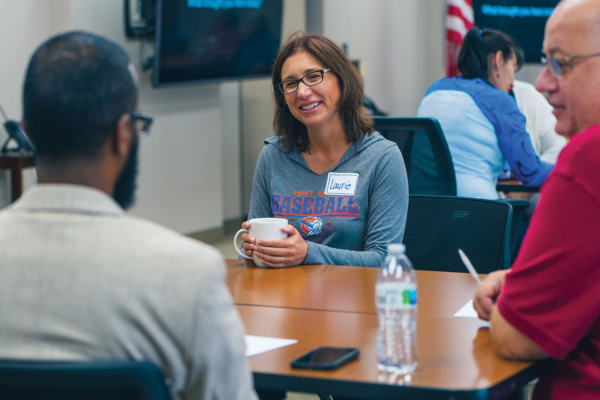Transformational Coaching
December 30, 2023
Standard Three of the Professional Standards for Educational Leaders (PSEL’s): Equity and Cultural Responsiveness states that “Effective educational leaders strive for equity of educational opportunity and culturally responsive practices to promote each student’s academic success and well-being.” Educational leaders should “Deliver actionable feedback about instruction and other professional practice through valid, research-anchored systems of supervision and evaluation to support the development of teachers’ and staff members’ knowledge, skills, and practice” and “Promote mutual accountability among teachers and other professional staff for each student’s success and the effectiveness of the school as a whole.”
An admirable vision. But a look beneath the surface made it clear that this vision was not a reality at Pacific High School. Student achievement data revealed significant gaps between demographic groups. Failure rates in some math and second language classes were as high as 40%. Enrollment in Advanced Placement classes was dominated by white and Asian students. During the course of walkthroughs with Principal Peters it became clear that there were a number of ineffective teachers, mostly veteran teachers who had been resistant to improvement over the years.
Peters had been at Pacific for twelve years, as a government teacher, volleyball coach, and assistant principal before being promoted to the principalship a year ago. Peters is popular; he has good relationships with staff and students. He is under pressure to address student achievement issues at Pacific, but he is hesitant to rock the boat.
How might the Blended Coaching approach support principal Peters in working with his teaching staff? A coach might first assess Peters’ knowledge and skills as they relate to teacher supervision. Is he able to access and analyze formative and summative student achievement data? Does he have a strong understanding of effective teaching strategies? Does he have the skills to observe teachers, to utilize the supervision process to help teachers to improve their practices, to build effective professional development programs and professional learning communities? Around these sorts of topics, “ways of doing”, Instructional Coaching may be appropriate.
But it seems that Peters has a more fundamental challenge. His “way of being” is preventing him from making a difference for staff and students. Peters is failing to provide his teachers with actionable feedback and failing to promote accountability because at his core he does not see himself as an instructional leader. At his core, his fear of disrupting his relationships on campus keeps him from having high expectations of his teaching staff.
Peters is paralyzed by a narrative that goes something like this: “Some of these teachers simply aren’t going to change, and if I pressure them to change, they will turn against me and the climate here will turn sour. It is enough if me and my assistant principals focus on keeping things here positive and orderly.”
In order to meet professional standards, in order to have a significant positive impact on his school site, Peters is going to have to change his “way of being”. Peters’ coach is going to have to engage in what we call Transformational Coaching.
Here are a few steps that a coach might take with Peters to support him in growing into an instructional leader:
- Help him to develop his sense of urgency by having him shadow a few students (for multiple hours) in less than effective classrooms so that he might develop and understanding of what his students are experiencing.
- Suggest that he consider whether his narrative (see above) is getting in the way of moving the school forward. Suggest that he build a new narrative (turn a rut story into a river story): That he can leverage his good relationships and reputation to take risks in having high expectations and holding staff accountable. That most of his staff wants him to step up to instructional leadership.
- Have him select one academic department as a focus area for the year, and work with him side by side as he observes and coaches teachers and facilitates professional development and learning communities.
- Observe and coach him as he changes the primary focus of his leadership team from student activities and discipline to supervising and supporting instruction.
Professional knowledge and skills (ways of doing) are necessary but not sufficient for school leaders. School leaders must possess high levels of emotional intelligence. They must, to use language from the PSEL’s, “act ethically and professionally in personal conduct, relationships with others… promote the professional norms of integrity, fairness, transparency, trust, collaboration, perseverance, learning, and continuous improvement….place children at the center of education …promote the values of democracy, individual freedom and responsibility, equity, social justice, community, and diversity… lead with interpersonal and communication skill, social-emotional insight, and understanding of all students’ and staff members’ backgrounds and cultures…and provide moral direction for the school.” These are all ways of being, elements of personality and personal development. These are dispositions that are not likely to be developed through undergraduate programs, or graduate pre-service programs. They are elements of performance that coaches must be prepared to recognize and develop in their coachees.
Here are some of the basic moves a coach might use providing what we call Transformational Coaching:
- Use multiple data sources in order to understand and provide feedback to a coachee. One-on-one conversations behind closed doors are essential to coaching, but in order to truly understand a coachee’s performance and provide feedback, they should be observed in a variety of contexts. Coachees should be observed in casual hallway interactions, facilitating meetings, in supervisorial conferences, and so on. 360° instruments can provide coaches and coachees with valuable insights around school culture, and around how the coachee is perceived and received. In Peters’ case, it was evident that he was well liked but not looked to as an instructional leader.
- Start from breakdowns. In effective coaching relationships, problems are viewed as learning opportunities to be embraced rather than swept under the rug. Shadowing students helped Peters to develop a sense of urgency and possibility around instructional improvement.
- Listen to the coachee’s stories and test them. All of us rely on narratives in order to make sense of the world. Oftentimes, those narratives limit our possibilities. In the above scenario, Peters is telling himself that moving decisively to deal with instructional issues would put his relationships and the schools stability in jeopardy.
- Develop and test new interpretations that could help the coachee to deal successfully with the breakdown. Peters came to understand that his good relationships provided a space in which he could take risks and exercise leadership, and that by improving teaching and learning at Pacific, all would benefit.
- Use hypothetical situations and role playing to help the coachee to practice new ways of being. Peters’ coach prepared him for touchy post observation conferences through planning sessions and role playing.
- Create possibilities for the coachee to practice new ways of being in the real world.Building on Peters experience as a government teacher, he taught a few sample lessons, and facilitated the social sciences teacher PLC.
We celebrate the fact that school leadership positions offer tremendous, ongoing opportunities for personal and professional growth. What other job offers the possibility of having a positive impact upon hundreds of lives, is never boring, and pays you to walk around hallways and playgrounds crowded with energetic young folks? What other job requires you to interact with such a wide range of people and professions? Of cultural backgrounds? What other job throws challenges at you ranging from bloody noses to polarized politics? Learning to do these jobs, the required ways of being and ways of doing, is no easy task. Skillful coaching can accelerate and sustain that learning.
AASA and The Wallace Foundation partner to work on the Educational Leadership Initiative to develop, test and share useful approaches for training of education leaders.
Other Articles in this Series:
- What is Coaching?
- Why Coaching and Coaching-Based Supervision
- Coaching Basics
- Coaching-Based Supervision
- Building a Coaching-Based Culture
Take the Next Step...
Interested in taking the next step to build your Coaching skills? Visit the following AASA professional learning programs:
Advertisement
Advertisement
Advertisement
Advertisement



